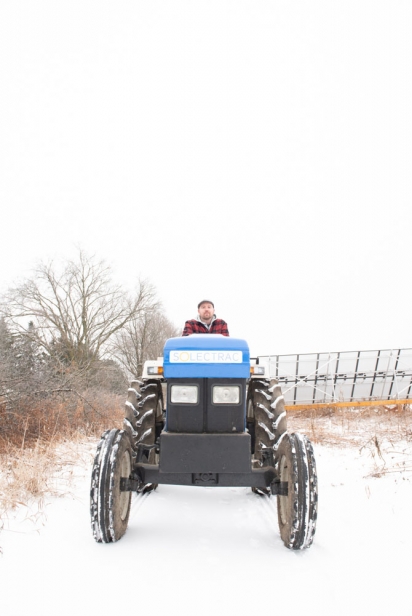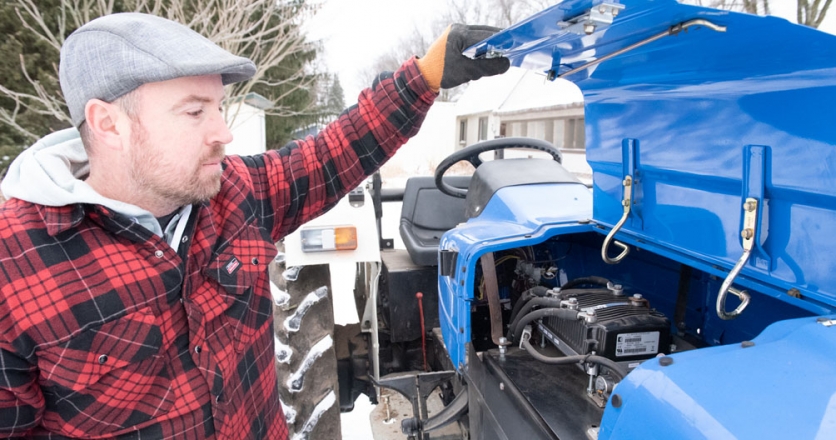Gaining Traction
When Tony Neale starts up his tractor, his eardrums aren’t blasted with the deafening rumble of a diesel engine. His fully electric tractor is quiet enough that he can enjoy songbirds while driving it. Yet, the powerful little machine with 40 horsepower and a lift capacity of 1,000 pounds is more than adequate for organic vegetable farming.
Wheelbarrow Farm is one of the first in Canada to use this kind of technology. Since 2018, Neale has been spreading compost, harrowing, seeding and harvesting his vegetable crops perched on his quiet, carbon emission-free machine.
He has quite a view from his tractor seat: “It’s a narrow property — about 10 acres,” he says. “The land slopes down into a cedar forest.”
It may be relatively small, but the orchard and fields are full. “We have hundreds of fruit and nut trees, six greenhouses, about 40 vegetable crops and solar panels that power the farm.” Powering the farm includes, of course, powering the tractor he sits on. Neale wasn’t always sitting on such a quiet, carbon emission-free tractor. Like most vegetable farmers who consider the environmental impact of their work, he faced a frustrating dilemma: To reach the yields necessary for greater commercial viability; diesel machinery was a must.
Neale had a long day of tilling soil on his diesel tractor a few years ago when the notion of an electric tractor first crossed his mind. “After a long day of using the tractor, it’s loud. You’re breathing in all this diesel exhaust. If you put in a lot of hours on it, it starts to add up,” Neale says, referring to the toll noisy diesel tractors can have on a farmer’s health. Luckily, being on a tractor all day also means Neale had a lot of time to ruminate. “I thought, what the heck, it’s 2017. There are electric cars out there, why aren’t there electric tractors?”
Neale had a hunch electric tractors just made sense — even more so than electric cars. “One of the issues getting electric vehicles on the market was the range of the battery pack. Well, on a farm, you’re close to home, and your range is small,” meaning that you’re not going to run out of juice in the middle of nowhere.
Another problem electric-car developers have faced is the hefty weight of the battery pack, which is a problem when you want to go great distances at a good clip. “On a tractor, extra weight is beneficial.” A tractor, after all, needs traction, and weight helps with that.
That very evening in 2017, Neale researched his options, and his hunch was confirmed: electric tractors are coming. And one developer in northern California caught his eye. Neale sent off an email that ended up changing the day-to-day operation at Wheelbarrow Farm.
Neale’s email landed in Stephen Heckeroth’s inbox. His company, Solectrac, has developed tractors that are 100 percent battery-powered and intended for smaller-scale commercial agricultural use. The electric utility bills itself as the ideal tool for farms, vineyards, stables and livestock operations, and it works with a range of attachments typically used on a vegetable farm such as Neale’s: tillers, discers and seeders.
Solectrac’s aim is to help farmers to operate using renewable, non- polluting energy, and provide them with an alternative to thevolatile prices of fossil fuels. In fact, many farmers in developing nations are ahead of the curve on this. “We have a lot of interest from farmers and NGOs, especially in Africa, where the fossil- fuel infrastructure is not developed,” Heckeroth explains.
“Bringing electric tractors into the fields allows those nations to leapfrog directly to clean renewable energy solutions, which are much less expensive and will contribute to slowing the climate crisis,” he says. Beyond the cost of fuel, these farmers are also finding that because electric tractors have fewer moving parts than their diesel counterparts, maintenance and service costs drop dramatically, reducing maintenance and service costs.
As for North America, it’s a bit of a mixed bag so far: “There is growing interest from the small-farm sector to do their part in addressing climate change. People are becoming more aware as their regions are affected by ever-worsening weather emergencies, from droughts to torrential rains, and of course, fires,” Heckeroth says, but that’s not true across the board. “Industrial agriculture has the inherent problem of its scale. There are no electric tractors that are large enough to perform the work of plowing giant fields at this time.”
At any rate, Solectrac’s technology is promising, and it raised the interest of the India-U.S. Science and Technology Forum, which awarded Solectrac a three-year research and development grant in 2014. The resulting prototype earned Heckeroth a grant from the National Science Foundation in the United States, helping to commercialize his tractors.
Soon after Neale sent his email, he and Heckeroth hit it off, and Neale even travelled to northern California to help assemble some tractors himself and learn hands-on. This trip would equip him to handle better any issues he might run into back on the farm. Heckeroth was impressed with Neale: “Tony is one of those rare individuals who practises what he preaches. He shows how small farms can feed their local communities and slow the devastating effects of climate change.”
Larger international manufacturers, such as John Deere and Fendt, are starting to introduce electric tractors, indicating a market-wide acknowledgement of farmers’ readiness worldwide to operate ecologically. Still, these are not for large- scale agriculture.
Back home in Uxbridge, it’s Wheelbarrow Farm’s solar panels that ensure Neale's new tractor runs on renewable energy. During the six sunniest months of the year, the farm’s daytime electricity needs are covered. In addition to charging the tractor, the solar panels power the irrigation system and the everyday needs of those who live on the farm. They power lights, cooking, laundry and refrigeration. At night, while the solar panels aren’t producing electricity, the farm derives power from the hydro credits it has accumulated by sending its excess electricity into the grid. “Basically, we power everything, just from these two sets of panels.”
At US $45,000, the cost of Wheelbarrow Farm’s solar tractor is more expensive than a similar new model with a combustion engine, but the low operating costs — no fuel bills, few repairs — made the purchase a sound investment for Neale.
Aside from the financial savings, “these emerging technologies are also an investment in our future: clear air, clean water, high-quality food and enjoyable, quiet machines for farmers to use, " Neale says.
Wheelbarrow Farm
535 Durham Regional Rd. 13, Sunderland, Ont.
wheelbarrowfarm.com | 647.335.3190 | @wheelbarrowfarm








